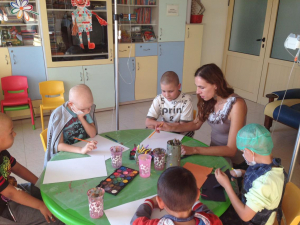
ARTON PROGRAM - The therapeutic power of the group
Creative projects involving group work - general musical performance or group painting, collage, sculpture - are useful in helping to explore and strengthen social...
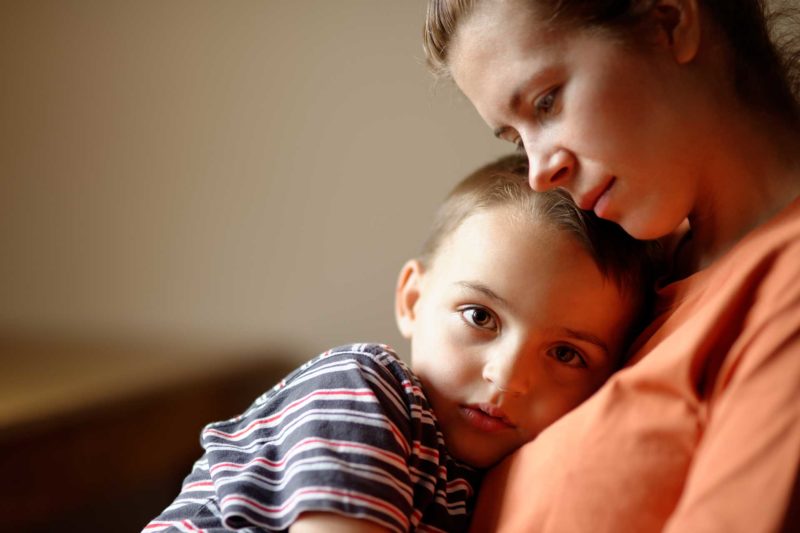
Whether the loss is a grandparent, a parent, a classmate or even a beloved family pet, the grieving process can be difficult and every child will grieve in his own way. Parents, caregivers and educators wondering how they can help will find many answers to their questions in the following guide, which has been assembled with advice from several experts in the area of child and adolescent grief. You will find tips broken down into a range of ages and experiences, and information about what to say, who should say it, what to look out for and how to help.
We all cope with death and grief differently. If you have several children, you may find that they express how they are feeling in surprisingly divergent ways. This can come down to personality as well as developmental age.
It is a fact that children grieve differently from adults. Young children may not even understand what death means, or that people who have died won’t be coming back. They may worry they have done something to cause the death. On the other hand, they might not seem too concerned about it, or even go from crying one moment to wanting to play the next. It is also normal for a child to feel angry at the person who has died (or someone else entirely). As children get older they may begin to understand more, but will still need help from their parents and other caregivers on how to process and cope with loss.
Knowing what to say and how to support children during this time isn’t easy. It is likely that you, too, are grieving and trying to deal with your own emotions. While you can’t protect children from loss and the pain it may cause, you can play a major role in helping them feel secure and cope in the healthiest way possible.
If at all possible the person delivering the sad news should be the person closest to the child, even if that person is a parent who is also grieving. It is okay if the person sharing the news is sad or crying, but she shouldn’t be so overwhelmed that she doesn’t have control over her emotions, which would alarm the child even more in an already scary and difficult situation. If the grieving parent is too upset to deliver the news somewhat calmly then it should be the next closest person to the child who breaks the news.
There’s no perfect time to share the news so children should be told as soon as possible, within reason. Wait until the end of the school day if that’s only a few hours. The main consideration is that you don’t want your child hearing the news unexpectedly from some other source or walking into a situation where there are a bunch of adults standing around crying or in shock, which could be very scary for him.
Be thoughtful about where to have the conversation. You want to tell your child about the death somewhere where he can feel free to have whatever reaction he is going to have, and that is probably not going to be a public place. You might have the impulse to lessen the blow by sharing the news in a happy location, like a favorite ice cream parlor, but know that a treat won’t make the news any less sad or difficult for the child.
Try to use direct language and be prepared to give a brief explanation of how or why the death occurred because children will be curious. You don’t have to go into a lot of detail, however. With kids you want to start with the minimum amount of information and then add more based on the questions they ask. As long as it’s done in a calm and compassionate way, it is best to keep explanations shorter, simpler and more direct.
The words you choose will vary depending upon the child’s age and developmental stage, but experts agree that no matter what the age of the child there are certain guidelines you should stick to.
For many children, especially young kids, the death of a family pet may mean the loss of a lifelong friend. It may also be your child’s first personal encounter with death. Be open and honest about the incident if the death happens unexpectedly. If your pet is suffering from an illness that requires it to be euthanized, reassure your child that your vet has done everything she can but that your pet was too sick to ever recover. Avoid potentially vague and confusing phrases such as “put down.” Children told the pet has been “put to sleep” can develop a fear of going to sleep.
Death of a grandparent or other relative
The death of a grandparent is often a child’s first encounter with human loss of life and grieving. If your children have lost a grandparent, you can explain that most people do not die until they are very old, to assuage any fears they have that you or they may die next. If the relative who has died was a younger person like an aunt or an uncle, explain that they had an illness (or accident) that does not usually take the lives of younger people.
Death of a parent
This is a much more difficult and traumatic event for a child of any age to comprehend and cope with. The remaining parent is likely to be very upset, and showing sadness is fine. But choose a time when you feel you can share the news without feeling out of control of your emotions. Explain the death using developmentally appropriate words and make sure children know that they will still be taken care of. In the case of the death of a parent, no matter what the child’s age, professional counseling is often a good idea.
Terminally ill parent
If you are a parent or caregiver, keep the child up-to-date on the status of his parent’s health so that nothing comes as a surprise and so that he is not kept wondering and worrying about being there when his parent dies. If possible schedule regular one-on-one time quietly reading, playing cards or just talking with his sick parent so that he has some good memories of how they spent their time together toward the end of his parent’s life.
If you are a teacher or counselor at the child’s school, know that he may need more support and flexibility at this time. Keeping some routines and expectations is still important, as they can help normalize things for a child, making him feel more secure and giving him a break from his worries. Stay in touch with the child’s family and let a caregiver know if you believe the child needs additional support or even to share good news if he has had a particularly good day.
Death of a sibling
It is very unexpected when children die, whether by accident or due to illness. In young children such a loss often brings up questions from the surviving child of whether he is also in danger. Parents who suffer the loss of a child are likely to be inconsolable themselves, but it is important to reassure your children that they are safe and you will be there for them. Let them ask questions and know that they may go in and out of grief for many months while you as the parent are more likely to feel it continuously. Do not hesitate to bring in additional adult caregivers, such as a grandparent, aunt or friend for support.
A traumatic death is particularly hard to talk about, but children will be curious about how their loved one died and you should not avoid giving an explanation. Try to give children developmentally appropriate information without overwhelming them. For example, you might explain that the person had a disease that caused her brain to stop working the way it should, and that the doctors tried to solve the problem but they weren’t able to cure the disease.
As children get older you can begin to give more information. If the loved one died by overdose, you can explain that the disease was addiction, which made that person want more of a substance than was good for her. For teenagers, you can let them know what the specific substance was, and assure them that having this addiction didn’t make their loved one bad. As kids get older they may also hear that addiction runs in families. While this is important to keep in mind, you can explain that addiction is a complex disease that is caused by a combination of genes and environment. Having a relative who struggled with addiction does not necessarily mean that they will also struggle with it.
If the loved one died by suicide, you might explain that she had a psychiatric disorder, which is a disease in the brain, and it caused her to die. For older children, do share more information if they ask for it, but avoid sharing troubling details. Assure children that their remaining caregivers are healthy and will take care of them.
Expect children to be processing this death over the course of many years as their understanding of it changes with age. Dealing with such a difficult and traumatic loss may very well require the help of a professional.
The people your child spends her time with need to know if there has been a significant loss. Certainly teachers, school counselors, coaches, after-school program directors and other family members should be told.
It is important to keep in mind that you can tell the staff at your child’s school and it may stay on their radar for a week or two, but if the death is significant — like the loss of a parent — then it’s something your child will be dealing without throughout the year and you might need to continuously check in and remind them.
If your child is younger, you should also tell the parents of any of her close friends about the death. If your child is in middle or high school, you should ask if she wants to tell her friends’ parents or if you should do it.
If the person who has died is someone significant and the distance to your child’s school is drivable, experts recommend delivering the news in person. In cases where that’s not possible, most schools have a protocol established. Usually if you call the Registrar’s office, they will send a representative who will stay with your child while you deliver the news over the phone, make sure he gets connected with supportive friends, walk with him to the health center if necessary or help him pack a bag and get on a plane to return home for the funeral.
This depends somewhat on the particular child and on the child’s age. Little kids go in and out of grieving mode so it is okay to let them play alone in a room as long as you stay nearby in case they switch back into grieving. Keep play dates shorter and at your home for a while so that you can monitor them.
For teens, alone time after delivering the news is certainly appropriate if they want it. And with both teens and younger kids you always want to ask open-ended questions like, “What do you think?” or, “How are you feeling?” Tell them you know this will take time to process and let them know they can always come back to you with questions or just to talk about the loved one who has died.
If the death happens right around a holiday it’s unrealistic to expect that you’re really going to be able to have a happy celebration. You might be able to find moments of happiness, but chances are everyone is going to be preoccupied with the loss of the person who has died and you shouldn’t try to hide or force your child to hide her grief. That said, you should still acknowledge important occasions, such as a child’s birthday or graduation, because ignoring them could also be painful.
If the person who has died is close, the whole year is going to be a year of “firsts” without that person, so celebrations like the first Thanksgiving, birthday, Christmas or Hanukkah without that person are going to be hard. Do what you can to maintain traditions as much as possible, but know, once again, that you and your child will likely experience moments of joy along with some sorrow.
Funerals, wakes and memorial services are an important part of the grieving process and a way to say goodbye to the person who has died. But when it comes to whether a child should attend the funeral of a loved one, there is no right or wrong answer. A child should never be forced to attend a funeral. If he indicates that he wants to go, then he should be encouraged to do so. If the child is young, plan to bring a favorite babysitter or someone the child trusts who can leave with the child if he decides he’s had enough before the service is over.
Be sure to prepare your child for what he will see. Let him know that people might be dressed in dark colors and that they will be very sad and some might be crying, for example. Explain if there will be a casket that contains the body, and any other important details.
At this age kids lack a real understanding of death and are generally unable to process the permanence of it. They are very present-oriented and don’t understand that death means “forever.” They may ask the same questions over and over again. Be patient, consistent and reassuring. A child who is grieving may have a series of brief but intense responses.
Kids this age may still see death as reversible. They may draw inaccurate conclusions that they caused the death — something called “magical thinking.” They tend to ask a lot of concrete questions: “How did he die?” “What will happen to him now?”
At this age kids’ thinking has matured and they are more logical. They may still want to see death as something that is reversible, but they are beginning to understand that it is final.
School-age children tend to ask specific questions and have a desire for detail. They may also be concerned for how others are responding to the death. They want to know what the “right” way to respond is, and are beginning to have the ability to mourn and to understand and recognize mourning in others.
Despite their more logical thinking they may become overly fearful of sickness and injury because they don’t quite understand the mechanisms by which people die. Kids can also get fixated on why someone died, especially if it violates their logical principles of right and wrong. Under both of these circumstances try to help children develop an explanation for the death that makes sense to them. When they get older they can begin to understand the loss in a more sophisticated way.
Teenagers are capable of abstract thought and have a much more “adult” concept of death.
Grieving is a natural process and it takes time. But symptoms that persist beyond six months or are very impairing can indicate that your child may need professional help to overcome her grief. Some signs your child may need professional help include:
While your first impulse may be to protect and comfort your children, it is crucial that you seek help for your own grief. If you are parenting or supporting a grieving child, one of the best ways to help is to ensure that you are taking care of yourself, too.
Find good sources of support. Research shows us that how well a child does after a death is linked to how well the adults in his life are doing. This doesn’t mean hiding your grief from your child. Rather, it means ensuring that you have people and activities in your life that provide comfort. If you need help or some time to take a break and clear your head, prioritize asking for it.
By accessing support, you model for your children ways to take care of themselves, and you reassure them that you will have the energy and presence to be there for them. Be prepared to accept help from friends, relatives and possibly mental health professionals.
Schools play a major role in children’s lives, and after a death — either a death in the family or in the extended school community — it is natural to expect that kids may experience grief that impacts their time at school or their ability to do schoolwork. Here are some guidelines for teachers and school psychologists on how to help make sure students feel supported and are coping in a healthy way.
There are few things more upsetting to a community than when a teen takes his own life. Here are several things school officials and teachers can do in the wake of this kind of tragedy to make sure students feel supported.

Creative projects involving group work - general musical performance or group painting, collage, sculpture - are useful in helping to explore and strengthen social...
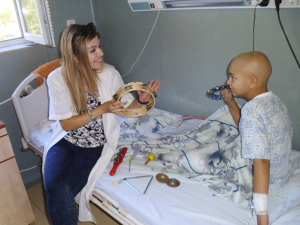
In the ARTON Program our team of oncopsychologists, art therapists and music therapists develops the process of children's creativity as a process of...
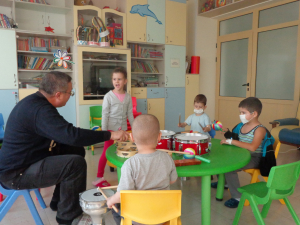
In ARTON sessions, creating a piece of music or a song is an emotional experience of coping and satisfaction for the participating children. They make friends with...
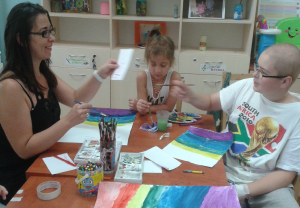
Painting provides patients with a spontaneous, plastic method of depicting thoughts and experiences. Painting with paints is not as structured as with pencil or...










